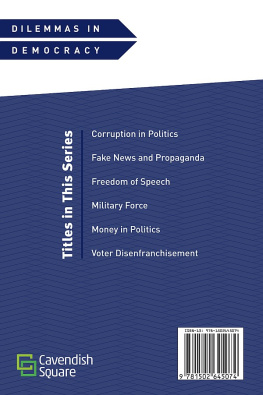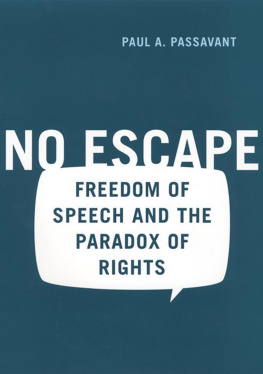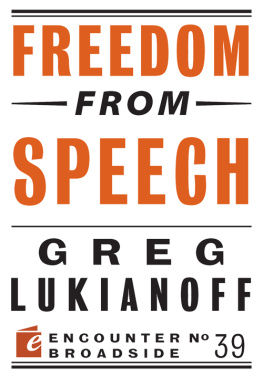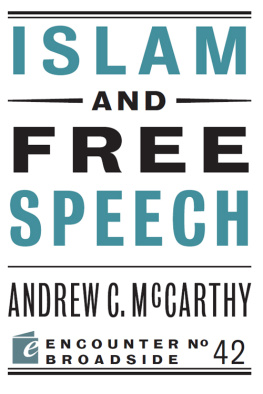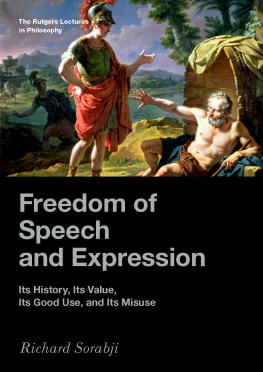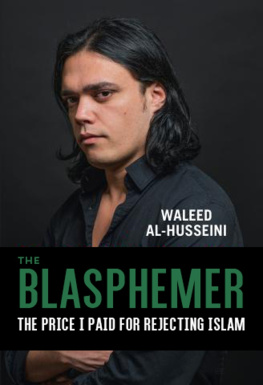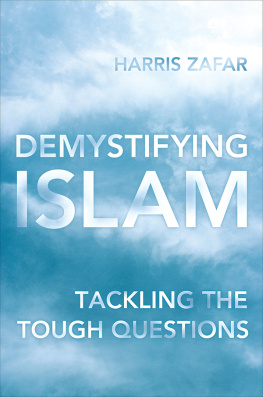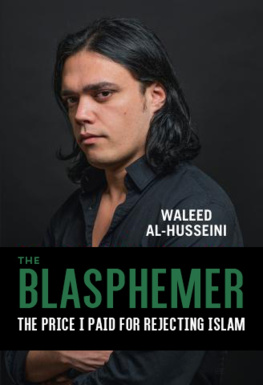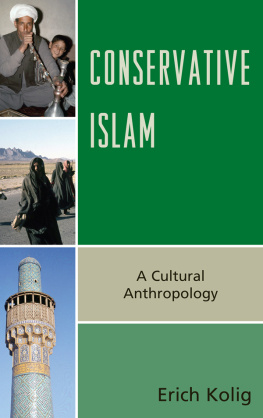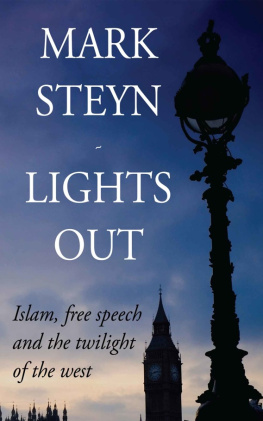Kolig - Freedom of Speech and Islam
Here you can read online Kolig - Freedom of Speech and Islam full text of the book (entire story) in english for free. Download pdf and epub, get meaning, cover and reviews about this ebook. year: 2014, publisher: Ashgate Publishing Ltd., genre: Politics. Description of the work, (preface) as well as reviews are available. Best literature library LitArk.com created for fans of good reading and offers a wide selection of genres:
Romance novel
Science fiction
Adventure
Detective
Science
History
Home and family
Prose
Art
Politics
Computer
Non-fiction
Religion
Business
Children
Humor
Choose a favorite category and find really read worthwhile books. Enjoy immersion in the world of imagination, feel the emotions of the characters or learn something new for yourself, make an fascinating discovery.

Freedom of Speech and Islam: summary, description and annotation
We offer to read an annotation, description, summary or preface (depends on what the author of the book "Freedom of Speech and Islam" wrote himself). If you haven't found the necessary information about the book — write in the comments, we will try to find it.
Kolig: author's other books
Who wrote Freedom of Speech and Islam? Find out the surname, the name of the author of the book and a list of all author's works by series.
Freedom of Speech and Islam — read online for free the complete book (whole text) full work
Below is the text of the book, divided by pages. System saving the place of the last page read, allows you to conveniently read the book "Freedom of Speech and Islam" online for free, without having to search again every time where you left off. Put a bookmark, and you can go to the page where you finished reading at any time.
Font size:
Interval:
Bookmark:
FREEDOM OF SPEECH AND ISLAM
Freedom of speech and expression is considered in the West a high public good and an important social value, underpinned by legislative and ethical norms. Its importance is not shared to the same extent by conservative and devout Muslims, who read Islamic doctrines in ways seemingly incompatible with Western notions of freedom of speech. Since the Salman Rushdie affair in the 1980s there has been growing recognition in the West that its cherished value of free speech and associated freedoms relating to arts, the press and media, literature, academia, critical satire etc. episodically clash with conservative Islamic values that limit this freedom for the sake of holding religious issues sacrosanct. Recent controversies such as the Danish cartoons, the Charlie Hebdo affair, Quran burnings, and the internet film Innocence of Muslims which have stirred violent reactions in the Muslim world have made the West aware of the fact that Muslims religious sensitivities have to be taken into account in exercising traditional Western freedoms of speech.
Featuring contributions from experts across a spectrum of fields within Islamic studies, Freedom of Speech and Islam considers Islamic concepts of blasphemy, apostasy and heresy and their applicability in the modern world.
Edited by
ERICH KOLIG
University of Otago, New Zealand
ASHGATE
Erich Kolig 2014
All rights reserved. No part of this publication may be reproduced, stored in a retrieval system or transmitted in any form or by any means, electronic, mechanical, photocopying, recording or otherwise without the prior permission of the publisher.
Erich Kolig has asserted his right under the Copyright, Designs and Patents Act, 1988, to be identified as the editor of this work.
Published by
Ashgate Publishing Limited
Wey Court East
Union Road
Farnham
Surrey, GU9 7PT
England
Ashgate Publishing Company
110 Cherry Street
Suite 3-1
Burlington, VT 05401-3818
USA
www.ashgate.com
British Library Cataloguing in Publication Data
A catalogue record for this book is available from the British Library
The Library of Congress has cataloged the printed edition as follows:
Freedom of speech and Islam / edited by Erich Kolig.
pages cm
Includes bibliographical references and index.
ISBN 978-1-4724-2402-0 (hardcover ) - ISBN 978-1-4724-2403-7 (ebook) ISBN 978-1-4724-2404-4 (epub) 1. Freedom of speechReligious aspectsIslam. I. Kolig, Erich.
BP173.66.F74 2014
297.2'72dc23
2014006076
ISBN 9781472424020 (hbk)
ISBN 9781472424037 (ebk-PDF)
ISBN 9781472424044 (ebk-ePUB)
by Rex Ahdar
Erich Kolig
Christopher J. van der Krogt
Ghena Krayem
Erich Kolig
William Shepard
Negar Partow
Nahid Afrose Kabir
Bassam Tibi and Thorsten Hasche
Katharina Vlker
As the collection editor I have standardised spellings of non-English terms except in direct quotations. This may not conform with chapter authors usage and preferences, but for the sake of uniformity and simplicity a particular standard had to be imposed. Arabic, Persian and Turkic terms by and large have been Latinised and are rendered without ayn and hamza and other diacritical marks. Thus, for instance, it is simply Quran and sharia and not Quran and Sharia. However, where such marks are part of names proper or in cases where their absence may be confusing as for instance in Shii and Ismaili they have been retained in simplified form.
Quran quotes have been taken from various sources and using various translations which may produce verbal and substantive differences. It goes without saying that translations of one and the same verse can differ noticeably, allowing for different exegesis and considerable divergence in understanding.
The list of acknowledgements can be short. The chapter authors have not benefitted materially from their effort in this publication project. They have simply responded to my invitation to produce an essay on the topic of free speech in relation to Islam and lay their thoughts on the matter open honestly and without prospects of tangible rewards. It goes without saying that authors were free to exercise their right to free speech, allowing them to express any opinion, not necessarily shared by the editor. Some scholars I invited to contribute may have declined for the reason that they did not wish to be published together with the views of others they do not share. This is very regrettable as it is exactly the purpose of this volume to assist in initiating a dialogue between seemingly irreconcilable viewpoints.
It would be churlish of me not to acknowledge a debt to some of my colleagues, research assistants, associates and graduate students (mainly at the universities of Otago and Vienna, where I taught) who over the years have helped me in gaining an understanding of Islam and Muslim issues, as have many non-academic Muslims through patient explanation and their lived example. In particular, my friend Rex Ahdar, Professor of Law at Otago University, has stimulated my interest in legal issues and their reference to Islam. Thanks to Owen Baxter of the Otago University IT Centre for his electronic troubleshooting efforts. Tricia Craggs, Ashgate desk editor, readied the manuscript for printing with exemplary efficiency and professionalism.
I am grateful to my wife Nicole for giving me the space when I was busy with this project, oblivious to the needs of everyday life. I also owe a debt of gratitude to my brother Helmut in the USA who, although as a university-trained, coldly rational and pragmatic engineer he has little use for Islam, supplied me generously with relevant books.
ERICH KOLIG
Dunedin, New Zealand, May 2013
Rex Ahdar is a professor at the Faculty of Law, Otago University, Dunedin, New Zealand, and an expert in churchstate relations and religious freedom. He is author, co-author, editor and co-editor of numerous books, among them Law and Religion (2000), Sharia in the West (2010) and Religious Freedom in the Liberal State (2005, 2nd edn 2013).
Thorsten Hasche is currently completing a PhD thesis on political Islam and holds a teaching position at the Institute for Political Science at the University of Gttingen, Germany. His main research interests are political Islam, systems theory, theories of international relations and methodology of the social sciences.
Nahid Afrose Kabir is a senior research fellow at the International Centre for Muslim and non-Muslim Understanding at the University of South Australia, Adelaide. She was a Visiting Fellow in the Islam in the West programme at the Center for Middle Eastern Studies at Harvard University, USA in 200911. Dr Kabir is the author of Muslims in Australia: Immigration, Race Relations and Cultural History (2005), Young British Muslims: Identity, Culture, Politics and the Media (2010) and Young American Muslims: Dynamics of Identity (2013).
Erich Kolig is a retired New Zealand and Austrian social/cultural anthropologist who taught at Otago University, Dunedin, New Zealand, and the University of Vienna, Austria. Currently, he is Honorary Fellow in Religion at Otago University. He has authored and edited several books and volumes and many articles on indigenous politics, Islam in general, New Zealand Muslims, radical Islam in Indonesia, Australian Aboriginal culture and other topics. Among his very recent work, he is the author of
Next pageFont size:
Interval:
Bookmark:
Similar books «Freedom of Speech and Islam»
Look at similar books to Freedom of Speech and Islam. We have selected literature similar in name and meaning in the hope of providing readers with more options to find new, interesting, not yet read works.
Discussion, reviews of the book Freedom of Speech and Islam and just readers' own opinions. Leave your comments, write what you think about the work, its meaning or the main characters. Specify what exactly you liked and what you didn't like, and why you think so.

